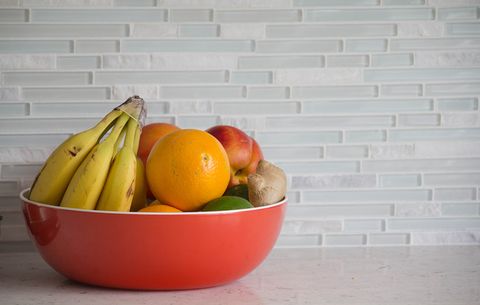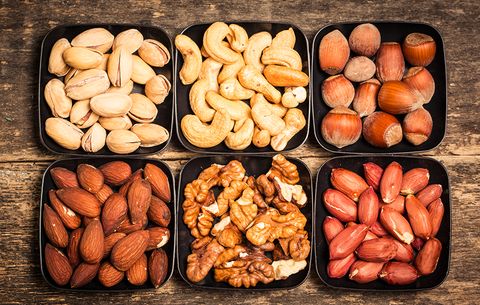It’s easier than you think!
Declutter Your Life is a month-long initiative to help you manage stress and boost your health by learning the principles of banishing clutter and restoring a sense of order to your world.
If you’re trying to slim down, consider this very important fact: How you store the food in your kitchen matters almost as much as which foods are there in the first place.
It’s a good idea to stock up on healthy staples like fruits, veggies, whole grains, and lean proteins, of course. But if you don’t put them—and those tempting, junky snacks that your family members insist on having around—in the right place, they might not do you much good.
Don’t believe it? More and more, science is uncovering that what we see in our kitchens can have a significant impact on our food choices. Which means that if you want to lose weight, you need to make the good stuff easy to access—and keep the diet derailers out of your line of vision. That’s the basic principle anyway, but there are lots of small, specific ways to put this idea into practice.
Here, the expert-approved tips to help you organize every corner of your kitchen—and start losing weight.
1. Hide empty-calorie snacks.
And all those nibbles can seriously add up. In one Health Education & Behavior study, researchers found that women who stored cereal and soda on their countertops weighed about 20 pounds more, on average, compared to those who didn’t. The lesson? Aim to keep those countertops food-free (more on where the snacky stuff should go later). There’s just one exception…
2. Keep your fruit bowl stocked.
The reasons are twofold. Fruit’s a low-calorie snack, and seeing it is a good reminder to eat it instead of rifling through the fridge or cabinet for something else, says Sarah Pflugradt, RD. At the same time, fruit just isn’t as tempting as, say, pretzels or chocolate. So there’s a pretty good chance you’ll only grab that apple or banana if you’re actually hungry.
3. Pre-portion healthy packaged snacks.
Pflugradt recommends pre-portioning snacks into individual snack bags or containers as soon as you bring them home. It’ll help discourage mindless snacking since you’re less likely to grab a handful from a single-serve container compared to a full-size bag. And when snack time does roll around, pre-portioned amounts make it harder to overeat.
4. Organize your pantry and fridge strategically.
And even if you do remember there’s a box of donuts hidden in the depths of the pantry, keeping them tucked away could be enough to deter you from eating them. “If you have to exert more energy to get something, you have more of a chance to think about whether you really want it,” Fear says.
So where should the healthy stuff go? Designate a spotlight zone for the most nutritious foods in your fridge and pantry, like the front of the center shelf. Keeping healthy staples right up front makes them easier to find, so you don’t have to dig past that leftover cake or mac and cheese. More importantly, findings suggest that the center shelf tends to be where our eyes focus first. And other studies show that we’re more likely to fill our plates with healthy foods if those are the first foods we see.
5. Stock up on canned goods.
All of which can add up to more pounds lost. In fact eating 3/4 cup of beans or legumes daily could help you drop half a pound in six weeks—even without making any other changes to your diet, according to an American Journal of Clinical Nutrition review of 21 studies.
6. Use the right containers.
Remember, the stuff you see is the stuff you’ll most want to eat. By keeping tempting foods out of sight, you’ll automatically eat less of them. Case in point: One Cornell University study found that workers ate two fewer chocolates per day from an office candy dish when the chocolates were stored in an opaque bowl with a lid compared to a clear one.
7. Clear the clutter.
Why? In one Environment and Behavior study, researchers had women spend time in a clean kitchen and in a messy kitchen. In both kitchens, they were offered snacks like carrots and cookies and told they could eat as much as they wanted. What happened? When the women spent time in the messy kitchens, they ate about 100 more calories’ worth of cookies.
“Any additional stress can trigger overeating, so keeping things neat could help you feel more content—and less noshy—in your living space,” Fear says. And if you have to be in the kitchen but haven’t had time to straighten up, at least try to corral the mess to one area and give yourself a neat working space, she adds.
8. Add some candles.
Just make sure to do your meal planning and prepping beforehand with the regular lights on. People make healthier choices in brighter light—so you might be more likely to decide on salmon over creamy pasta, and nibble less while you cook.
Source: www.prevention.com






























